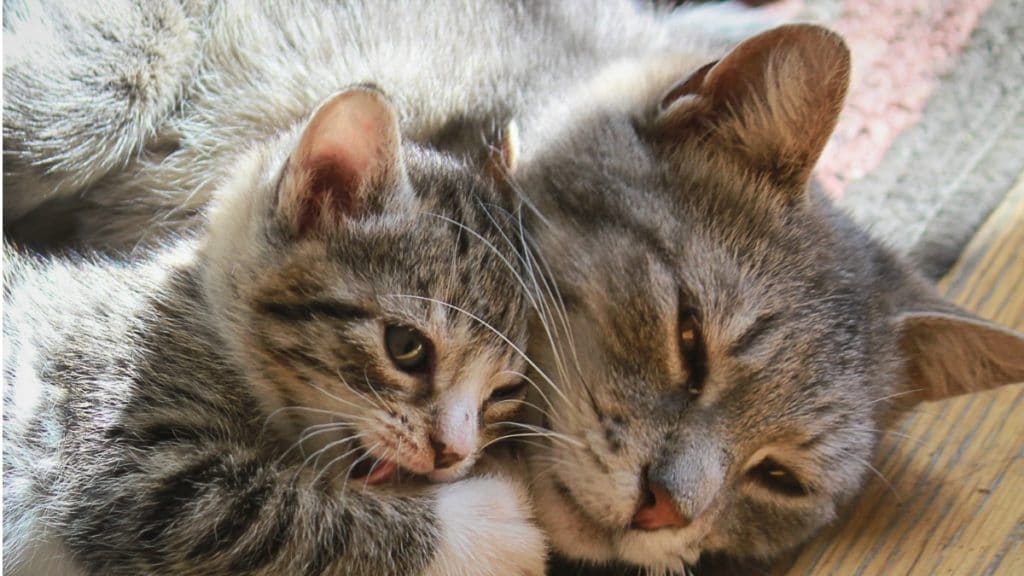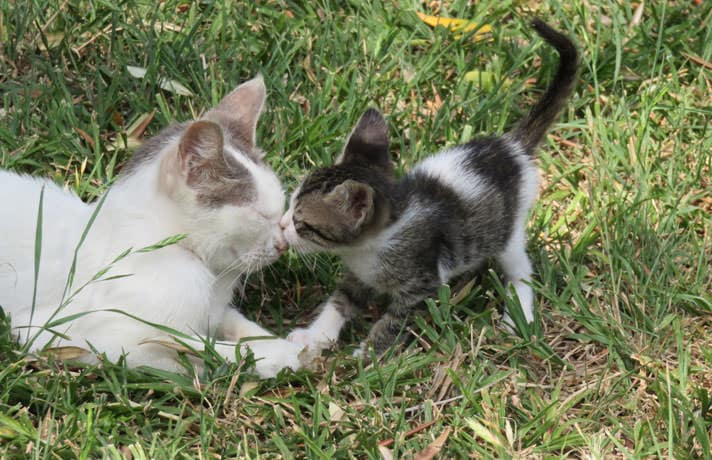Why Do Mother Cats Attack Their Kittens?

As one of the most nurturing and protective creatures in the animal kingdom, mother cats usually take care of their kittens with great affection and devotion. However, sometimes these same mothers can display aggressive behavior towards their offspring, leaving many people wondering why mother cats attack their kittens. In this article, we will examine seven potential reasons why mother cats may attack her kittens and explore the underlying causes of this behavior.
7 Reasons why Mother Cats may attack their Kittens
Here are 7 common reasons why a Mother Cat may be provoked into attacking here kittens.
(1) Kitten is sick or has been abandoned by the mother
One common reason why a mother cat may attack her kittens is if one of them is sick or injured. The mother may recognize that the sick kitten is weaker and may not survive, and her instincts tell her to separate it from the rest of the litter to protect them. This is common amongst kittens who are born with birth defects. The mother cat may even eat the newborn kitten if this happens.
Similarly, if a kitten has been abandoned by the mother, she may attack it to prevent it from rejoining the litter, potentially endangering the rest of her offspring.
(2) Medical Issues in the mother cat
Medical issues can also cause a mother cat to become aggressive towards her kittens. For example, if the mother is experiencing pain or discomfort, she may lash out at her kittens if they try to nurse or cuddle with her. Similarly, if the mother is suffering from an infection or illness, this may also cause her to become irritable and aggressive.
One common issue is Cat Mastitis, which causes the nipples to swell and hurt. If a kitten tries to suckle from the mother while she is in this condition, she may lash out.
(3) Lack of Resources
If a mother cat feels that she doesn’t have enough resources to care for her kittens, she may become aggressive towards them. This can include a lack of food or water, as well as inadequate space or shelter. In such cases, the mother cat may see her kittens as a threat to her own survival, leading her to attack them in an attempt to protect herself.
Alternatively, she may choose to kill some of the kittens to give the rest a better chance of survival.

(4) Overstimulation
Another reason why a mother cat may attack her kittens is if they are overstimulating her. Kittens are naturally curious and playful, and they may want to explore their surroundings and play with their littermates.
However, if they become too rough or noisy, they may overstimulate their mother. This may cause her to react aggressively to try and stop them.
(5) Behavioral Issues
Just like people, cats can suffer from behavioral issues that cause them to behave abnormally. If a mother cat has a behavioral issue such as anxiety, aggression, or compulsive behavior, this may cause her to attack her kittens. In such cases, the mother cat may not be able to control her behavior, even if she wants to.
The personality and upbringing of the Mother cat also comes into play here. If the mother is irritable and grumpy by nature, she will be more prone to aggressive acts towards her kittens. Likewise, its possible she did not get the chance to socialize with other cats correctly during her upbringing. For example, if she was separated from her mother at an early age. This might result in her not knowing how to properly interact with her kittens.
(6) Play time:
Kittens love to play, and may pounce on their mother or nip at her ears or tail as part of their playtime. However, if the mother cat is not in the mood for play or is feeling irritable or overwhelmed, she may perceive these actions as threatening and attack her kittens in response.
Likewise, you may end up mistaking “play time” for an aggressive act. Mother cats sometimes do play-fights with their kittens. This should not be mistaken for an act of aggression. As a rule of thumb, if no claws are being used, then it’s a play-fight. Their deamoner and body posture should also be quite relaxed.
(7) The Kittens are older
Finally, a mother cat may attack her kittens when they reach a certain age. As kittens grow older, they become more independent and may start to challenge their mother’s authority. If the mother feels that her kittens are becoming too bold or disobedient, she may become aggressive towards them as a way to assert her dominance and maintain control over the litter.
Similarly, as kittens grow older, the mother begins to distance herself from them. This is common amongst feral cats, because they will soon get pregnant again, and have to care for a new litter of kittens. Usually once the kittens are around 3 months old, the mother will begin pushing them away. She may resort to aggressive measures as well.
Sure, here is a revised section on “How to prevent this behavior” with more detail and additional techniques:

How to prevent this Behavior
If you have a mother cat that is displaying aggressive behavior towards her kittens, there are several things you can do to prevent this behavior from continuing.
Providing Adequate Resources
Make sure the mother cat has access to adequate resources, including food, water, and shelter. A lack of resources can cause a mother cat to become aggressive towards her kittens, as she may see them as a threat to her own survival.
Medical Treatment
If the mother cat is experiencing pain or discomfort, take her to the veterinarian for treatment. Pain and discomfort can cause a mother cat to lash out at her kittens if they try to nurse or cuddle with her. Common medical issues that can cause aggression in mother cats include cat mastitis and infections.
Provide a safe space
Provide a safe and comfortable space for the mother cat and her kittens. This includes a quiet and secluded area where the mother cat can retreat if she feels overwhelmed by her kittens.
Distract the Mother
Monitor the mother cat’s behavior and intervene if necessary. If you notice the mother cat is becoming aggressive towards her kittens, try to distract her with toys or treats. You can also separate the kittens from the mother temporarily to give her a break.
Proper Socializing
Socialize the mother cat properly from an early age. A well-socialized mother cat is less likely to display aggressive behavior towards her kittens. If you adopt a feral cat or a cat with a history of aggression, it’s important to work with a behaviorist to help socialize the cat and prevent aggressive behavior.
Separate the Kittens
Separate the kittens from the mother at the appropriate age. As kittens grow older, they become more independent and may start to challenge their mother’s authority. If the mother cat is becoming aggressive towards her kittens as they get older, it may be time to separate them and find them new homes.
Be Patient and Understanding
Keep in mind that mother cats may attack their kittens for a variety of reasons, some of which are outside of your control. It’s important to be patient and understanding with your cat. You won’t be able to change the behavior of your cat overnight, but with the right training methods, combined with positive reinforcement, you can ensure the mother cat and kittens can get along.
Seek Professional Help
If the mother cat continues to display aggressive behavior towards her kittens despite your best efforts, it’s important to consult with a veterinarian or animal behaviorist to rule out any underlying medical or behavioral issues.
Neutering and Spaying
Lastly, make sure to neuter or spay your cats to prevent unwanted pregnancies and reduce the likelihood of aggressive behavior in future litters. This will actually help in many ways. Spaying/Neutering cats reduces makes them less aggressive, and more sociable. It also removes the problem of the mother cat having to prepare for a future batch of kittens.
By following these tips, you can help prevent aggressive behavior in mother cats and ensure the safety and well-being of both the mother cat and her kittens.


